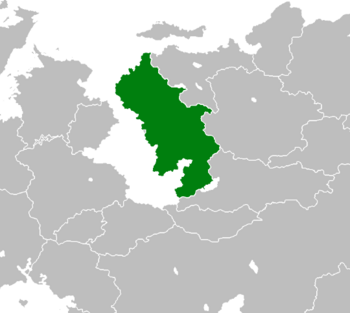Kingdom of Hytekojuznia: Difference between revisions
No edit summary |
No edit summary |
||
| Line 1: | Line 1: | ||
{{WIP}} | |||
{{Infobox former country | {{Infobox former country | ||
|native_name = <small>''Hitekijuznija Karaliste'' ({{wp|Latvian|Hytek}})<br>''Hijtekojusnija Karalystė'' ({{wp|Lithuanian|Juznik}})</small><br><small>''Keninkryk fan Hytekajuslân''({{wp|West Frisian language|Belgan}})</small> | |native_name = <small>''Hitekijuznija Karaliste'' ({{wp|Latvian|Hytek}})<br>''Hijtekojusnija Karalystė'' ({{wp|Lithuanian|Juznik}})</small><br><small>''Keninkryk fan Hytekajuslân''({{wp|West Frisian language|Belgan}})</small> | ||
Revision as of 20:15, 7 June 2019
This article is incomplete because it is pending further input from participants, or it is a work-in-progress by one author. Please comment on this article's talk page to share your input, comments and questions. Note: To contribute to this article, you may need to seek help from the author(s) of this page. |
Kingdom of Hytekojuznia | |
|---|---|
| 1884–1913 | |
|
Flag | |
| Motto: Karaļai un valstij! (For king and country!) | |
 Hytekojuznia on the outbreak of GW1 | |
| Status | Kingdom |
| Capital | Krasno (1884-1900; 1903-1913) Pekrasta (1900-1903) |
| Common languages | Latvian Lithuanian Belgan |
| Religion | Alydianism |
| Demonym(s) | Hytekojuznik |
| Government | Monarchy |
| King | |
• 1884-1894 | Johannes I |
• 1894-1913 | Johannes II |
| Historical era | First Great War |
• Union between Margrave of Hytekia and Grand Duchy of Juznia | 1860 |
• Established | 18 February 1884 |
• Entry into GW1 | 19 January 1896 |
• Leidense-Liidurian Occupation | 1900-1903 |
• People's Revolution | 1913 |
• Disestablished | 23 April 1913 |
| Population | |
• 1884 | 18,700,000 |
• 1896 | 23,000,000 |
• 1913 | 21,000,000 |
| Currency | Hytekojuznik Nauda |
| Today part of | Hytekia Juznia |
| |
The Kingdom of Hytekojuznia (Hytek: Hitekijuznija Karaliste; Juznik: Hijtekojusnija Karalystė;Belgan: Keninkryk fan Hytekajuslân), commonly referred to as Hytekojuznia was an independent kingdom that existed from its unification under Johannes I and IV, the Margrave of Hytekia in 1884 to its eventual downfall to the Hytekojuznik People's Revolution and the People's State of Hytekojuznia in 1913. The Kingdom was involved in the First Great War (mainly in the Alemannic Theater on the side of the Concordat, mainly due to their territorial ambitions to conquer the city of Anlaufhafen from Liiduria. The Bipartite eventually forced the Kingdom to surrender after the capital, Krasno, was captured in 1900.
